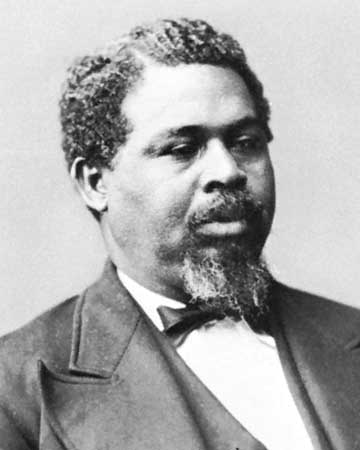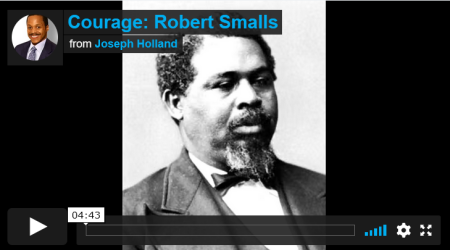Robert Smalls
WORD OF THE DAY
PERSONAL CONTEXT
HISTORICAL CONTEXT
SUCCESS PRINCIPLE
CIVICS LESSON
Click below to listen to audio:
DARE TO DO GREAT THINGS
My race needs no special defense, for the past history of them in this country
proves them to be the equal of any people anywhere. All they need is an equal
chance in the battle of life.
Robert Smalls
On May 12, 1862, as dusk fell over Charleston harbor, the military transport boat “CSS Planter” was docked in its usual spot at the wharf below the Confederate Army’s headquarters. Robert Smalls, a slave, had been assigned to assist General Ripley in piloting the Planter as it delivered Civil War supplies, troops and land mines in its survey of South Carolina waterways.
Having been hired out as a longshoreman, sail maker and wheelman throughout his teen years, Smalls had picked up knowledge about Charleston’s harbor and the mechanics of steering the Planter as well. In keeping with the custom of the times, the Planter’s three white officers disembarked to spend the night ashore, leaving Smalls and the slave crewmen on board. About 3 a.m. on May
13th, Smalls, wearing the captain’s uniform including a straw hat similar to Ripley’s, sailed the Planter to a wharf where his wife and family and those of the other escaping crewmen were waiting to be picked up. Smalls correctly signaled as he steered the ship past five Confederate harbor checkpoints, but at Fort Sumpter, the last and most precarious barrier, the alarm was raised.
Undeterred, Smalls maneuvered the ship ahead to the Union-controlled enclave, moving swiftly beyond the range of Confederate guns. He had his crew flourish the white bed sheet that his wife had brought on board. As the Planter approached the Union clipper “Onward”, Smalls took off his hat, waved his arms and shouted:
Good morning, sir! I’ve brought you some of the old United States guns, sir!
The daring escape that Smalls engineered was more than a military coup; it was a cultural breakthrough. The courageous action was a major factor in the decision by President Abraham Lincoln to allow blacks to enlist in the Union Army. Following his distinguished service as a Union soldier, Smalls used the notoriety that he gained from the great escape to build an even more remarkable career as a businessman, publisher, and politician. He led the fight in the state legislature to establish in South Carolina the first free and compulsory public school system in the United States, before serving in the United States House of Representatives throughout Reconstruction.
Small’s courage was not a moment in time in a theater of war. Smalls dared to do great things, leading a lifestyle of intrepid initiative; you can follow his example as you resolve to:
TEST THE WATERS
Your waters may not be as treacherous as the actual waters through which Smalls had to maneuver, but you still have to be willing to get off the shore and venture beyond the safe harbors of your life. Greatness lies before you in the deep waters. Forge ahead into the unknown. Your destiny will rise.
TACKLE YOUR FEARS
Small’s faith kept him going, overcoming his fears through the perils of night. Let your faith extinguish your fears as it sparks your courage.
TAKE DOWN BARRIERS
Courage is the quality of mind and spirit that enables you to face your barriers — whether they be internal or external — and overcome them. Like Smalls, first develop your plan. As you implement it, pay attention to the barriers of your checkpoints all along the way, but keep your eyes on the horizon. That’s where you’ll find your victory.
TRIGGER THE FUTURE
Your greatness now leaves a legacy for future generations, as Henry Wadsworth Longfellow reminds us:
Lives of great men all remind us,
We can make our lives sublime,
And departing, leave behind us,
Footprints on the sands of time
WORD OF THE DAY
Intrepid – fearless; adventurous.
DISCUSSION POINTS
PERSONAL CONTEXT
Robert Smalls was a slave; owned by a white man, he had no rights.
HISTORICAL CONTEXT
Civil War: the bloodiest conflict in American history, which determined whether the nation would live according to equality under law or the tyrannical rule of slavery.
SUCCESS PRINCIPLE
Take Down Barriers: What barriers do you need to courageously take down to fulfill your purpose in life?
CIVICS LESSON
BIPOC Rights: Evolving Status & Battle for Progress
The Civil War was the biggest test of the American ideal of equal rights in U.S. history. The fact that the side advocating equal rights won paved the way for other advances in human equality since that time. What was the biggest barrier that Smalls and other Blacks of his era had to overcome? 160 years later, what has changed for people of color in America? What are some challenges that still confront them? What can be done to improve their status and strengthen their rights?


